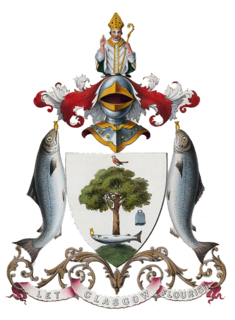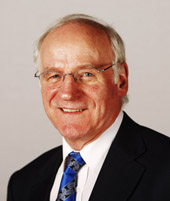
West Dunbartonshire is one of the 32 local government council areas of Scotland. The area lies to the west of the City of Glasgow and contains many of Glasgow's commuter towns and villages, as well as the city's suburbs. West Dunbartonshire also borders onto Argyll and Bute, East Dunbartonshire, Renfrewshire and Stirling.

East Dunbartonshire is one of the 32 council areas of Scotland. It borders the north-west of the City of Glasgow and contains many of the suburbs of Glasgow as well as many of the city's commuter towns and villages. East Dunbartonshire also shares borders with North Lanarkshire, Stirling and West Dunbartonshire. The council area covers parts of the historic counties of Dunbartonshire, Lanarkshire and Stirlingshire.

Glasgow City Council, the local government body of the city of Glasgow, Scotland, became one of the newly created single tier local authorities in 1996, under the Local Government etc. (Scotland) Act 1994, with boundaries somewhat different from those of the City of Glasgow district of the Strathclyde region: parts of the Cambuslang and Halfway and Rutherglen and Fernhill areas were transferred from the city area to the new South Lanarkshire council area.

Dunbartonshire or the County of Dumbarton is a historic county, lieutenancy area and registration county in the west central Lowlands of Scotland lying to the north of the River Clyde.

Clydebank is a town in West Dunbartonshire, Scotland. Situated on the north bank of the River Clyde, Clydebank borders Dumbarton and the villages of Old Kilpatrick, Bowling and Milton to the west, as well as the town of Bearsden in East Dunbartonshire, and the Yoker and Drumchapel areas of the adjacent City of Glasgow. Historically part of Dunbartonshire, Clydebank is part of the registration County of Dumbarton, the Dunbartonshire Crown Lieutenancy area, and the wider urban area of Greater Glasgow. Clydebank was founded as a police burgh on 18 November 1886.

The Local Government etc. (Scotland) Act 1994 is an Act of the Parliament of the United Kingdom which created the current local government structure of 32 unitary authorities covering the whole of Scotland.

Gilbert Martin Paterson, born in Glasgow, 1942 is the Scottish National Party Member of the Scottish Parliament (MSP) for the Clydebank and Milngavie constituency, which he gained from Labour on 5 May 2011.

East Dunbartonshire is a county constituency of the House of Commons of the Parliament of the United Kingdom (Westminster). It elects one Member of Parliament (MP) by the first past the post system of election. The current MP for East Dunbartonshire is Jo Swinson.

West Dunbartonshire is a county constituency of the House of Commons of the Parliament of the United Kingdom (Westminster). It elects one Member of Parliament (MP) by the first past the post system of election and covers the same area as the county of West Dunbartonshire.

Paisley North was a constituency of the Scottish Parliament (Holyrood). It elected one Member of the Scottish Parliament (MSP) by the first past the post method of election. Also, however, it was one of nine constituencies in the West of Scotland electoral region, which elected seven additional members, in addition to nine constituency MSPs, to produce a form of proportional representation for the region as a whole.
Dunbartonshire was a county constituency of the House of Commons of Great Britain from 1708 to 1801 and of the House of Commons of the Parliament of the United Kingdom from 1801 to 1950. It elected one Member of Parliament (MP) using the first-past-the-post voting system.

West of Scotland was one of the eight electoral regions of the Scottish Parliament that were created in 1999. Nine of the Parliament's 73 first past the post constituencies were sub-divisions of the region and it elected seven of the 56 additional-member Members of the Scottish Parliament (MSPs). Thus it elected a total of 16 MSPs.

Dumbarton is a constituency of the Scottish Parliament (Holyrood). It elects one Member of the Scottish Parliament (MSP) by the first past the post method of election. Also, however, it is one of ten constituencies in the West Scotland electoral region, which elects seven additional members, in addition to ten constituency MSPs, to produce a form of proportional representation for the region as a whole.
Jim Bollan is a Scottish Socialist Party councillor in West Dunbartonshire. He was until recently the only elected SSP representative in Scotland, although now sits as a member of the West Dunbartonshire Community Party.
Elections to West Dunbartonshire Council were held on 3 May 2007, the same day as the other Scottish local government elections and the Scottish Parliament general election. The election was the first one using six new wards created as a results of the Local Governance (Scotland) Act 2004, each ward will elect three or four councillors using the single transferable vote system a form of proportional representation. The new wards replace 22 single-member wards which used the plurality system of election.

Martin John Docherty-Hughes is a Scottish National Party politician. He has been the Member of Parliament (MP) for West Dunbartonshire since 2015. He defeated incumbent Gemma Doyle, winning 30,198 votes and 59.0%.
The 1999 elections to West Dunbartonshire Council were held on the 6 May 1999 and were the second to the unitary authority, which was created, along with 28 other local authorities, under the Local Government etc (Scotland) Act 1994.
The next Elections to West Dunbartonshire Council will be held on Thursday 4 May 2017, on the same day as the 31 other local authorities in Scotland. It will be the third successive Local Council election to run under the STV Electoral System. The election will use the six wards created under the Local Governance (Scotland) Act 2004, with 22 Councillors being elected. Each ward will elect either 3 or 4 members, using the STV electoral system.
The West Dunbartonshire Community Party is a minor political party involved in local government elections in West Dunbartonshire, Scotland. The party was formed in 2015 to fight the 2017 West Dunbartonshire Council election.













